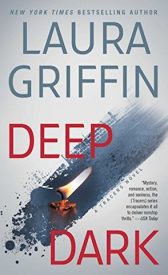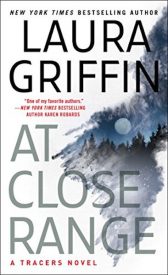
Scorched
The Tracers Series · Book six
The dead don’t speak, but Kelsey Quinn knows their secrets. As a forensic anthropologist at the Delphi Center crime lab, Kelsey makes it her mission to identify bodies using no more than shards of bone, and her find at a remote Philippines dig hints at a sinister story. When Kelsey’s search for answers puts her at the scene of her exfiancé’s murder, only one man can help her. The same man who broke her heart just months before, and who is also a prime suspect. Faced with an ultimatum— Kelsey or his job—Gage Brewer did the only thing a Navy SEAL could . . . but that doesn’t mean he stopped wanting Kelsey. Now Kelsey is running for her life and Gage is her last line of defense. As the threats escalate, Kelsey realizes this conspiracy goes deeper and higher than they could have guessed. With the clock ticking down on a madman’s plot, the slightest misstep will have unthinkable consequences. . . .
Read an Excerpt
"Truly poignant."
— Single Titles
"This entry in the Tracers series has it all: dynamite characters, a taut plot and plenty of sizzle to balance the suspense, without overwhelming it. Fortunately for newcomers, the book stands on its own, so you can dive right in, and then go looking for the rest of the series."
— RT Book Reviews, TOP PICK!
"A fast-moving plot with likeable, interesting characters creates a compelling read."
— BookPage, TOP PICK for Romance!
Scorched
The Tracers Series · Book six
- Book 1: Untraceable
- Book 2: Unspeakable
- Book 2.5: Unstoppable
- Book 3: Unforgivable
- Book 4: Snapped
- Book 5: Twisted
- Book 6: Scorched
- Book 7: Exposed
- Book 8: Beyond Limits
- Book 9: Shadow Fall
- Book 10: Deep Dark
- Book 11: At Close Range
- Book 12: Touch of Red
- Book 13: Stone Cold Heart
- Bundle: A Tracers Trilogy
Scorched
Indian Ocean
East of Mombasa, Kenya
0300 hours
The Black Hawk flew well below the radar and Lieutenant Gage Brewer sensed more than saw the water below. Light cloud cover, no moon. Perfect conditions for an op like this, which was exactly what made him itchy. Gage and his teammates had trained long and hard to expect the unexpected, and there wasn’t a SEAL among them who trusted an operation that got off to a perfect start.
“Going black,” came the voice in Gage’s headset. At his CO’s order, the helicopter went dark except for the faint red glow of the control panel.
A ripple of movement as the eight men of Alpha Squad triple-checked gear and prepped for battle. Gage reviewed the mission. Tonight’s landing zone was the size of a driveway–just small enough to make things interesting. He visualized the layout of the vessel they planned to fast-rope onto in a matter of minutes. The Eclipse was a hand-crafted yacht, custom built in Maine specifically for this voyage–which had gone horribly wrong when the boat was seized by Somali pirates. Less than three hours after capturing the yacht, the pirates had used a satellite phone to call in an eight-figure ransom demand.
Gage pictured the captain, a man he was tasked with rescuing: fifty-two-year-old Brad Mason of Sunnyvale, California, who fancied himself an adventurer. According to the intel Gage’s team had received, Mason was some kind of computer genius who had made billions with his software company before taking a year off to sail around the globe with his family.
Gage didn’t doubt that a man who’d made a freaking billion dollars off something he’d invented was smart. But his genius didn’t extend to tactical matters, apparently, because the guy had posted updates about his journey and details of his route on Facebook, making him a prime target for the brazen and surprisingly high-tech pirates who roamed the seas just north of here. But dumbass moves aside, the guy was an American citizen under attack on the high seas, and the SEALs had been ordered to get him out of harm’s way.
Along with his daughter.
Avery Mason, seventeen, had taken a year off of high school to go on the expedition. A copy of her varsity soccer photo had been passed around the briefing room a few hours ago. She was a blue-eyed, freckle-faced brunette, and one look at her had set the entire SEAL team’s mood to extra-grim.
Conspicuously absent from the rescue list was forty-eight-year-old Catherine Mason, who had been shot and thrown overboard yesterday, after the pirates’ first deadline passed without a ransom drop. Mason’s extended family had been allotted twenty-four more hours–of which three remained–to come up with the ransom, or else Avery would die.
No one doubted the pirates would make good on their threat. That was the bad news. The good news was, the seven Somalis on the yacht were lightly armed–only a half dozen AKs and some handguns among them.
The helicopter swooped lower. Sweat trickled beneath Gage’s flak jacket as he contemplated the battle plan. The sweat was from heat, not fear. After eight years in the teams, there wasn’t much that rattled him anymore. Dodging bullets and IEDs and operating behind enemy lines had taught Gage to be cool under pressure, to take what life threw at him. And whatever happened, he and his team would get the mission done and get out, because failure was not an option.
Not usually.
A vision of Kelsey flashed through his mind, and Gage wondered where she was tonight. He shouldn’t think about her now. But even as he commanded himself to focus, he wished for one more moment to tell her… what? There was nothing left to say. And yet before every op, he felt a burning need to talk to her.
“Two minutes.”
His CO’s voice snapped him back to the task at hand. Joe Quinn sounded calm, resolute–they way he always did before an operation. There was a determination about him that steeled his team, no matter what the risks in front of them. Just the tone of his voice reminded them of the SEAL creed, which went with them everywhere.
If knocked down, I will get back up, every time. I will draw on every remaining ounce of strength to protect my teammates and accomplish our mission. I am never out of the fight.
On the horizon, the faint flicker of the target vessel. The helo dipped lower. As they neared it, the boat was just a lone white speck in the darkness. The pirates had switched off almost all the lights and kept below deck so as not to make themselves easy targets. Even the pirates on the mother vessel–a dilapidated shrimping boat being used as a communications headquarters–had kept a low profile. The Somalis had learned their lesson when some of their comrades had been taken out by SEAL snipers a few years back.
“It’s go time.”
Quinn’s words sent a jolt of adrenaline through him. Gage ditched his headset and stood up. Beside him, Derek Vaughn did the same. As the two largest men of Alpha Squad, Gage and the Texan would be working in tandem to get the hostages off the yacht and onto an inflatable boat that would take them to the frigate that had been lurking nearby since the early hours of the crisis.
“Aces, man,” Derek said over the din, his usual way of wishing Gage luck. Behind him, Mike Dietz slapped him on the back while Gage traded insults with Luke Jones–another routine. SEALs were a superstitious bunch.
And that was it. They’d trained. They’d practiced. They were ready.
The door opened and the noise increased, making it difficult to communicate except by hand signal. The first man kicked the rope out. One by one, the commandos disappeared into the night. The pilot struggled not to suddenly gain altitude each time a three-hundred-pound load of man plus gear came off the rope. Gage waited for his cue, gripping the thick nylon in his hands. Quinn signaled go. Gage jumped out and slid down so fast that his gloves smoked.
The boat came alive with lights. A flash of muzzle fire as one of the pirates hosed down the squad. Derek took out the shooter just as a bullet zinged past Gage’s ear.
“Go, go, go!”
Gage’s boots hit the deck. He sprinted for the hatch and slid down the ladder, planting a brutal kick in the face of a man at the base. The man went down like a stone, but he looked unarmed and Gage swiftly zip-cuffed him as Derek leaped over them and kicked open the forward cabin.
“Cabin one clear,” Derek shouted.
Weapon raised, Gage kicked open one of the aft cabins. Pitch dark. He switched on the light attached to his helmet. On the bottom bunk was a bloodied man whose face was a nearly unrecognizable pulp. Looked like Brad Mason had been beaten with the butt of a machine gun.
“Hostage one secured,” Gage said into his radio, as Mike–the team corpsman–quickly moved to check his pulse. Despite the thunder of boots and the rat-tat-tat of gunfire up on deck, the hostage hadn’t moved.
“Alive,” Mike announced, but Gage was already kicking open the second aft cabin. He aimed his M-4 into the dimly-lit space.
Empty bunk.
A low moan, and Gage turned his attention to a lump in the corner. Someone curled in a fetal position. Gage crouched beside her and used his free hand to lift her face. Avery Mason’s blue eyes drifted shut and her head lolled back.
“Hostage two secured,” Gage reported. Her hair was matted with blood. He noted the blood on her shorts and thighs.
“Sitrep on the hostages,” Quinn demanded over the radio.
“Alive, but injured. Girl’s got a gash on her head and I think she’s been drugged. Scratch the boat evac. We need the helo back here.”
“Yo, Brewer, up and out.”
He glanced up to see Derek in the doorway with Mason slung over his shoulder in a fireman’s carry.
Gage scooped up the girl and positioned her limp body over his left shoulder. He moved for the ladder just as a man burst out from one of the cabinets.
Pop!
Pain tore through Gage’s shoulder as he squeezed the trigger. The man dropped. Luke lunged around the corner and put a bullet in his chest, just to be sure.
Gage managed to hang onto his gun as he grabbed the rail with his free hand and hoisted himself up the ladder. On deck he did a quick head count. Three pirates dead, four cuffed–plus one casualty below.
Cursing their bad intel, Gage eased Avery Mason onto the deck beside Mike, who was briskly bandaging her father’s leg injury.
“Knife?” Gage asked, looking at the nasty wound.
“We need that helo.” Mike glanced up at him. “Whoa, you’re hit.”
Gage looked at the patch of blood that was rapidly expanding on his right shoulder. Derek said something to him, but it was drowned out by the whump-whump of the approaching chopper. The rescue basket dangled from the hole.
Suddenly the helo lurched right, then left, doing evasive maneuvers. Gage swung around to face the shrimp boat, which was a dim shadow on the now-gray horizon.
“A stinger!” Derek shouted.
Gage’s pulse spiked as a trail of fire arced up from the distant boat. All eyes turned skyward as the pilot shot off tracers to fool the heat-seeking missile, but it was too late. The tail rotor exploded. The helo tipped sideways and cart-wheeled into the water with a giant splash.
“Joe!” Gage dropped his gun and ripped off his flak jacket. His teammates frantically did the same. Water rained down as Gage sprinted across the deck and dove off the boat.
The ocean hit him with an icy slap.
Basilan Island, The Philippines
24 hours later
Kelsey Quinn kneeled on the ground, tapping the sifting screen until the dirt disappeared and the tiny plastic object came into view.
“What is it?” Aaron asked over her shoulder.
Kelsey glanced up at her field assistant, who towered over the four Filipinos clustered around him.
“Tagapayapa,” a woman muttered in Tagalog.
“What?” Aaron looked at the Filipino anthropologist with puzzlement.
“Pacifier.” Kelsey pulled an evidence bag from one of the pockets of her cargo pants and labeled it with a permanent marker. She dropped the pacifier inside and darted a concerned glance at the woman whose face held a mix of sorrow and resignation.
The anthropologist held out a slender brown hand. “May I?”
Kelsey gave her the bag and watched as she squared her petite shoulders and trekked across the campsite to the intake tent, where this latest bit of evidence would be labeled properly and entered into the computer. Kelsey sighed. As a forensic anthropologist, she had traveled the world unearthing tragedy, and it amazed her how the people who had seen the most suffering always seemed to have the capacity to deal with more.
Kelsey got to her feet and dusted off her kneepads. Her legs and shoulders ached from being on screen duty all morning.
“Ready for a break?” Aaron asked.
“Think I’ll wait till noon.” She checked her watch and realized her mental clock was about two hours behind.
“You’re doing it again, doc.” Aaron passed her his water bottle and watched reproachfully as she took a gulp.
“Can’t be helped.” She handed the bottle back and repositioned her San Diego Padres cap on her head. “We’ve only got ten days left. There’s no way we’ll finish the second gravesite in that amount of time. What’d you hear about those klieg lights?”
“Nothing yet.”
“Dr. Quinn? Need your eyes over here.”
Kelsey glanced across the campground at the doctor standing beside the radiography tent. It was a welcome interruption. She could tell Aaron was about to launch into one of his lectures, and she was too tired to argue with him.
“Get me an update on those lights,” she told Aaron, then remembered to smile. “Please.” She jogged across the camp and ducked into the largest tent, which was blessedly cool because of the giant fan they used to keep the expensive equipment from overheating. Dr. Manny Villarreal, a short man who happened to be a giant in his field, was seated at a computer with his usual bandanna tied over his bald head. Today’s selection was army green to match his scrubs.
Kelsey zipped the tent door shut. She tilted her head back and stood for a few moments, letting the decadent eighty-degree air swirl around her.
“When you’re done slacking off…?”
“Sorry. What’s up?” Kelsey joined him at a computer, where the X-ray of a skull appeared on the screen.
“Victim thirty-two,” Manny said. “She came out of intake this morning.”
“She?”
He gave her a dark look. “Irene recovered a pink headband.”
Kelsey glanced across the tent at Irene, whose unenviable job it was to painstakingly disentangle every set of bones from the accompanying clothing and personal items. After being separated from the bones, each item had to be photographed and catalogued before being examined by investigators.
“You’re the expert,” Manny continued, “but I’m guessing the profile comes back as a four- to five-year-old female, about thirty-eight inches tall, based on the femur. In addition to the headband, Irene catalogued a pair of white sandals. What we didn’t find were any bullets or signs of bone trauma.”
“What about lead wipe?” Kelsey asked. The opaque specks typically showed up on X-ray after a bullet crashed through a human skull.
“None,” Manny replied. “And as I said, no broken bones. So no obvious cause of death.” He leaned back in his chair and gazed up at Kelsey, and a bleak understanding passed between them.
If this child hadn’t been marched to the edge of a pit and shot to death, like the rest of the people in the grave with her, then she’d died by other means. Most likely, she’d been buried alive and suffocated.
Kelsey’s chest tightened and she looked away.
“I–excuse me. I have to get some water.”
With that completely see-through excuse she ducked out of the tent and stood in the blazing tropical sun. She felt lightheaded. Her stomach churned, and she knew Aaron was right. She needed a break–a Coke at least, or a PowerBar to get her energy up before she did something embarrassing like faint in the middle of camp.
Lead from the front, her uncle always said, and he was right. Uncle Joe commanded Navy SEALs for a living, and he knew a thing or two about leadership. Kelsey needed to work hard, yes, but she also needed to set a good example for the six members of her team who had been toiling in the heat for weeks in the name of human rights. Kelsey was spearheading this mission on behalf of an international human rights group with backing from her home research lab–the prestigious Delphi Center in central Texas. She needed to be sharp and in charge, not passed out from exhaustion. She was young to be managing such a big job, and she knew more than a few people were expecting her to fail–maybe even hoping for it. She needed to prove them wrong.
Kelsey wiped the sweat from her brow with the back of her grimy arm. She traipsed across the camp and rummaged through a plastic food bin until she found a granola bar.
“Ma’am Kelsey?”
She turned to see one of her team members, Juan Ocampo, emerging from the jungle with his metal detector and his shaggy brown dog. Milo aspired to be a cadaver dog, but in reality was simply a well-trained mutt who went everywhere with Juan. Kelsey didn’t mind the pup. She liked him, in fact; he was good for morale.
Juan stopped beside her. His blue International Forensic Anthropology Foundation T-shirt was soaked through with sweat and his face was dripping.
“You need to come with me,” he said, and the low tone of his voice told her he didn’t want the others to know about whatever he’d found.
Kelsey shoved the rest of her granola bar in her back pocket and followed him into the jungle. A route had been cut through the dense tangle of trees and vines, but the terrain was steep and uneven. Kelsey was glad for her sturdy hiking boots as she made her way down the path she and so many workers had traversed for weeks now. That’s how long it had taken her team to recover the remains of a busload of civilians that had been hijacked by a death squad working for a local politician. Aboard the bus had been a rival politician’s family on their way to file nominating papers for the upcoming election. Each member of the family had been bound, tortured, and shot. The other bus passengers had been mowed down with machine guns and left in a shallow grave.
Kelsey swatted at mosquitoes as she neared the first burial site, where a pair of local police officers stood guard over the workers. Like most policemen in the Philippines, they carried assault rifles rather than handguns–yet another cultural difference she’d found unnerving when she’d first arrived in this country.
To Kelsey’s surprise, Juan walked right past the gravesite. He veered onto a barely visible path through the thicket of trees. Milo trotted out in front of him.
Kelsey’s nerves fluttered as she tromped down the hill. He couldn’t have found another pit. They’d counted fifty-three victims already, the exact number of passengers that local townspeople believed had been on the bus that went missing during last year’s election season. If there was another group of victims, surely her team would have heard something during their interviews with local families.
“You find gold in them thar hills?” Kelsey used her best John Wayne voice in a lame attempt to lighten the mood. Juan glanced back at her. He’d once told her he’d been named after the American actor and loved all his movies.
“I was out here this morning, ma’am, walking Milo.” Juan’s formal tone said this was no time for jokes.
Please not another death pit.
“I had the metal detector on, and it started beeping.”
Kelsey glanced at the device in Juan’s hand–one of their most useful pieces of equipment. It detected not only bullets and shell casings–which were valuable evidence–but also belt buckles, jewelry, and other personal objects.
“Look what I found.” He stopped beside a ravine, and Milo stood beside him, wagging his tail. Juan shifted a branch and nodded at the ground.
Human remains, fully skeletonized. Kelsey crouched beside them, feeling a familiar mix of dread and curiosity.
“Male,” she conjectured aloud. “Five-eleven, maybe six-feet.”
The height was unusual for a native Filipino. She studied the rotting clothing. Denim and synthetic fabrics withstood the elements better than soft tissue, and it looked as though this man had died wearing only a pair of jeans. She glanced around for shoes, but didn’t see any.
“What’d you hit on?” She nodded at the metal detector.
“Something under his head. I think there is a bullet, but I did not want to move anything.”
“Good call.” She frowned down at the remains.
“Do you think he tried to run?”
“Different postmortem interval from the others, I’m almost sure of it.” She glanced up at him. “He’s been here longer.”
Kelsey dug a latex glove from one of her pockets and pulled it on. She took out her digital camera and snapped a photograph before carefully moving a leafy branch away from the cranium. She stared down at the skull, and it took her a moment to realize what she was seeing.
“I’ll be damned,” she muttered, leaning closer.
On the road above them, the hum of a motorcycle. The noise grew louder, then halted, and she and Juan traded looks. Kelsey surveyed the trees lining the highway–the same highway the bus had been on when it was hijacked. Branches rustled. Kelsey stood and Juan reached for the pistol at his hip.
“Ma’am Kelsey!”
A boy stepped into view. Roberto. Kelsey breathed a sigh of relief and shoved her KA-BAR knife back in its sheath.
“Phone call, ma’am.” He scrambled down the steep hillside and emerged, grinning, from a wall of leaves. Roberto had appointed himself the camp errand boy and spent his days zipping back and forth to town, fetching supplies for the workers in exchange for tips. He reached into his backpack and produced the satellite phone that usually lived in Manny’s tent. The boy looked proud to be entrusted with such an important piece of equipment, and Kelsey handed him some pesos.
“Sir Manny said it’s important,” Roberto told her. “The call is from San Diego.”
Kelsey’s stomach dropped. Oh God, no. She jerked the phone to her ear. “Hello?”
For an eternity, only static.
“Kelsey?”
Just the one syllable and Kelsey knew. Gage. She’d been expecting this call for years. Her heart felt like it was being squeezed by a fist, but she managed to make her voice work.
“Mom, what is it?”


















